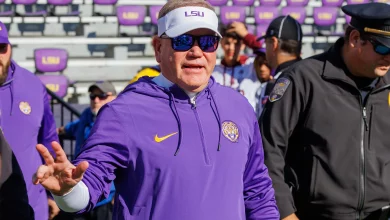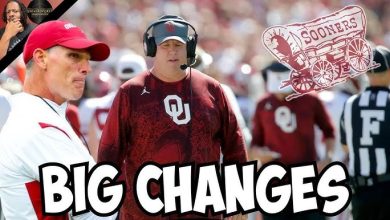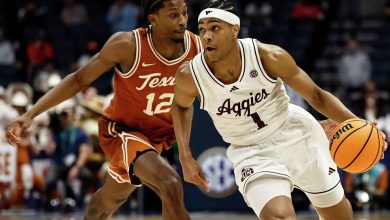Three Texas players struggle to start SEC play.

The University of Texas Longhorns entered their first season in the Southeastern Conference (SEC) with high expectations. As one of the most storied football programs in the country, Texas was poised to take the next step in their journey under head coach Steve Sarkisian. However, the early stages of SEC play have proven to be more challenging than many anticipated, with several players struggling to adjust to the increased level of competition.
The SEC is renowned for its physicality, speed, and overall talent depth, and these elements have exposed weaknesses in Texas’ game. While the Longhorns have plenty of talent on their roster, some players have not been able to find their rhythm in the demanding SEC environment. In this article, we will take a closer look at three Texas players who have struggled early in the season and analyze the reasons behind their struggles, as well as potential solutions for them moving forward.
1. Quinn Ewers: Adjusting to SEC Defenses
One of the most talked-about players heading into the season was quarterback Quinn Ewers. After a promising start to his college career at Ohio State, Ewers transferred to Texas in hopes of becoming the program’s long-term solution at quarterback. His raw talent and arm strength had scouts buzzing, and many considered him one of the top quarterbacks in the country heading into the 2023 season. However, Ewers’ transition into SEC play has been difficult, and his struggles have been apparent in the early part of the season.
Inconsistent Play
Through the first few games of SEC play, Ewers has had difficulty finding a consistent rhythm. While his arm strength is undeniable, his decision-making and accuracy have been a concern. In particular, his deep ball accuracy has not been up to the level that was expected. He has shown flashes of brilliance, making several impressive throws, but he has also been prone to mistakes, including interceptions and forced throws under pressure.
The increased speed and physicality of SEC defenses have been a major factor in Ewers’ struggles. While he had success in the Big 12, the SEC offers a different level of competition, with faster defensive backs and more aggressive pass rushers. This has led to more hurried throws and a lack of confidence in the pocket at times. Against SEC teams, the windows for throws are smaller, and the margin for error is much thinner. Ewers has not been able to consistently overcome this challenge.
Pressure and Expectations
Part of the struggle for Ewers has been the immense pressure placed on him as the face of the Longhorns’ offense. As a highly-touted quarterback, the expectations surrounding him have been sky-high. Texas fans, coaches, and analysts all expect Ewers to lead the team to the next level, but this level of pressure can be difficult to handle, especially when faced with adversity early in the season.
One area where Ewers could improve is in his ability to manage the game and stay calm under pressure. He has the physical tools to succeed, but part of the transition to the SEC will require him to develop a stronger mental game. Working on his poise, decision-making, and ability to stay composed in high-pressure situations will be crucial for his success moving forward.
What Can Ewers Do to Improve?
The good news for Ewers is that his struggles are not necessarily indicative of a lack of talent. Many young quarterbacks go through growing pains, especially when adjusting to the SEC’s elite defenses. To improve, Ewers will need to work on his consistency, particularly with his deep ball accuracy and his decision-making in the pocket.
Developing a better rapport with his receivers and increasing his chemistry with the offensive line will also be key. Ewers must trust that his offensive line will provide the protection he needs, and he must be patient in the pocket. Additionally, simplifying the offense at times and focusing on short-to-medium range throws can help Ewers gain more confidence and avoid the risky throws that have led to turnovers.
2. Bijan Robinson’s Success Diminishes Without Support
Bijan Robinson, the talented running back who was widely regarded as one of the top backs in the country, has faced difficulties adjusting to the SEC, particularly in terms of offensive line play and the defense he has faced. While Robinson is undeniably a gifted running back, his performance early in SEC play has highlighted how difficult it is to succeed in the league without a strong offensive line and complementary offensive play.
Lack of Offensive Line Push
Robinson has been one of Texas’ top players for years, and his ability to break tackles and create big plays was a significant part of the Longhorns’ success in the Big 12. However, in SEC play, he has struggled to find running lanes, as opposing defenses have been able to consistently disrupt Texas’ offensive line. Against more powerful defensive fronts, Robinson has not had the space to showcase his vision and elusiveness, which has limited his impact on the field.
The SEC features some of the most imposing defensive linemen in the country, and Texas’ offensive line has not been able to consistently provide Robinson with the push he needs to succeed. Without strong offensive line play, Robinson has been forced to fight for every yard, and his ability to break off long runs has been limited.
Heavy Defensive Focus
Another factor in Robinson’s struggles has been the focus that SEC defenses place on stopping him. As the focal point of the Longhorns’ offense, Robinson is often the first player opponents focus on when preparing for the game. In the SEC, where defensive talent is deep across the board, opposing teams have the resources to devote multiple defenders to shutting down Robinson. This has forced the Longhorns to rely on other aspects of their offense to generate points.
Without a more diversified offensive attack, Robinson’s opportunities to find space have been limited. The lack of a consistent passing game to complement his rushing ability has allowed defenses to focus solely on stopping the run, which has contributed to his struggles.
What Needs to Change for Robinson?
For Robinson to get back on track, the Longhorns need to improve their offensive line play. A better push from the offensive line will allow Robinson to find running lanes and build momentum, which is crucial for his success. Additionally, the Longhorns need to develop a more balanced offensive attack. By getting the passing game to be more effective, Texas will force defenses to play the pass more seriously, which will open up running lanes for Robinson.
Furthermore, Robinson could benefit from seeing more targets in the passing game. Utilizing him as a receiver out of the backfield would allow Texas to get the ball in his hands in space, reducing the need for him to fight for every yard on the ground. This type of versatility will keep defenses on their heels and allow Robinson to be a more dynamic weapon.
3. Xavier Worthy: Struggling to Find Consistency
Xavier Worthy, one of the most dynamic wide receivers in the country, has also faced difficulties adjusting to the rigors of SEC play. Coming off an impressive sophomore season in which he showcased his explosive speed and playmaking ability, Worthy was expected to be a major factor for Texas in 2023. However, like his teammates, he has struggled to maintain consistency in SEC games.
Dropped Passes and Missed Opportunities
One of the biggest issues for Worthy has been his inconsistency in catching the ball. While he has had a few highlight-reel catches, he has also dropped several passes that could have extended drives or led to big plays. In a competitive conference like the SEC, missed opportunities like these can be costly, and they have been a point of frustration for Worthy and the Texas offense.
Worthy has the speed and athleticism to be a game-changer, but his ability to make contested catches in tight windows has been questioned. SEC cornerbacks are known for their physicality and ability to challenge receivers at the line of scrimmage, and Worthy has not always been able to create separation when facing more talented defensive backs.
Increased Defensive Attention
As one of the top wide receivers on the team, Worthy has drawn increased attention from SEC defenses. Opposing defenses are aware of his ability to stretch the field, and they have made it a point to double-team him or place their best cornerbacks on him. This has limited his opportunities to make big plays downfield, and Texas has struggled to find a consistent deep threat.
What Can Worthy Do to Improve?
Worthy’s primary focus needs to be on consistency. He has shown that he can make the spectacular catch, but he needs to reduce the number of drops and focus on the routine catches that will keep drives alive. Additionally, working on his ability to beat press coverage and create separation from defenders will help him become a more reliable option in the passing game.
Worthy also needs to continue developing chemistry with Quinn Ewers. The timing between quarterback and receiver is crucial, and as Ewers adjusts to SEC defenses, Worthy must be patient and work on improving his route-running to better complement his quarterback’s strengths.









